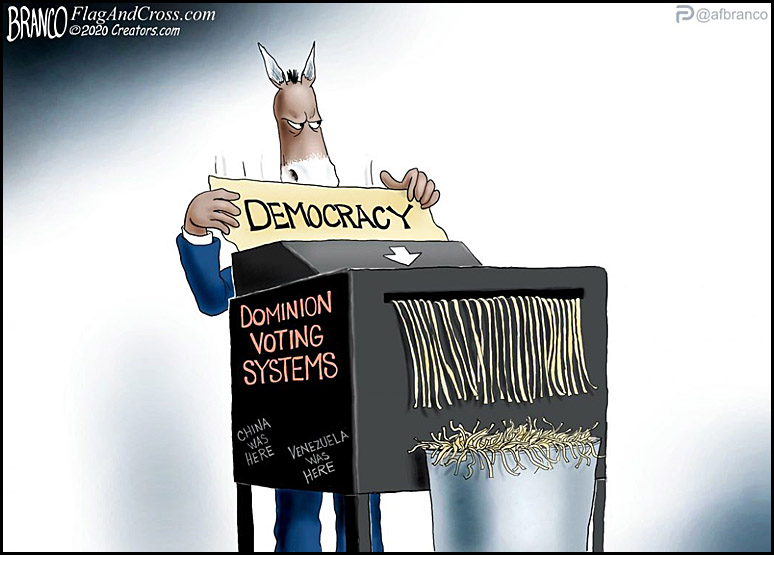If you watched the Trump election challenge legal team press conference on Thursday, November 19, 2020, you heard attorney Sidney Powell talk at some length but in general terms about how Dominion Voting Systems voting system equipment and software had some design features which would allow votes cast to be weighted or switched between candidates either manually or according to an algorithm. Sidney Powell went into much more detail in her interview on November 20, 2020, with Washington Examiner podcast host Larry O’Connor.
In this YouTube interview, television and radio talk show host Glenn Beck elicits a clear and simple description of how easily the Dominion Voting System equipment and software can be manipulated. The interviewee is Jeff Brown, the founder and chief investment analyst of Brownstone Research.
At one point in the video, Beck asked Brown why some of the blatant security vulnerabilities were designed and built in. Brown chuckled and said, “Why, to manipulate the voting results,” as if it should be obvious. Brown went on to explain that Dominion machines are used in “some pretty nefarious countries” where the leaders want to ensure they win every election.
The Trump election challenge legal team asserts that the results of the 2020 presidential election were changed as a result of hundreds of thousands of votes being manipulated by illegally manipulating electronic voting systems and software. The legal team represents that it has evidence that would be legally admissible in a court of law that would show that in about 10 large cities, there were votes cast for President Trump that were electronically counted as being for Joe Biden.
Most readers will ask this obvious question: Doesn’t the United States have some technical standards, some rules and regulations, which would prevent equipment and software like this from being used in our national, state, county, and local elections? The answer is a qualified “Yes.”
The United States Election Assistance Commission (EAC) produces a set of Voluntary Voting System Guidelines (VVSG).
Voluntary Voting System Guidelines (VVSG) are a set of specifications and requirements against which voting systems can be tested to determine if the systems meet required standards. Some factors examined under these tests include basic functionality, accessibility, and security capabilities. HAVA [Help America Vote Act] mandates that EAC develop and maintain these requirements.
HAVA requires that the EAC certify and decertify voting systems. Section 231(a)(1) of HAVA specifically requires the EAC to “… provide for the certification, de-certification and re-certification of voting system hardware and software by accredited laboratories.” The EAC has the sole authority to grant certification or withdraw certification at the Federal level, including the authority to grant, maintain, extend, suspend, and withdraw the right to retain or use any certificates, marks, or other indicators of certification.
To provide clear procedures to manufacturers for the testing and certification of voting systems to specified Federal standards, the EAC has produced the EAC Voting System Testing and Certification Program Manual.
The testing and certification program also was intended to serve four other purposes:
Support state certification programs. (usually administered coordinated by the Secretary of State)
Support local election officials (county and city clerks) in the areas of acceptance testing and pre-election system verification.
Increase quality control in voting system manufacture.
Increase voter confidence in the use of voting systems.
Given what Mr. Brown said in the YouTube video about the intentional design features in the Dominion Voting Systems equipment and software, we and our public officials ought to be demanding an explanation about how Dominion’s equipment and software could possibly have met the VVSG and the requirements in the Manual. How could Dominion’s equipment and software ever have received approval for use in a local mosquito abatement board election, let alone the 2020 general election to elect the President of the United States?
Until that question is answered to the satisfaction of over 72 million voters who thought they voted for President Trump’s re-election in November 2020, the EAC won’t be able to look voters in the eye and tell us we should have complete confidence in the accuracy of the voting systems and software used in our states regardless of our state’s selection from the FEC’s “approved” list of voting systems and software.


I wonder why/how President Trump’s advisors failed to challenge Dominion Voting Systems and Smartmatic, among others, before the election. It seems that the issues and ripeness for fraud were well know to many before the election.
Comment by Tributary — November 30, 2020 @ 1:49 pm
Tributary,
In most states the elections are administered at a county level in compliance with each state’s election laws. Elections and the equipment and materials to administer them are funded pretty much locally. The voting systems equipment “standards” mentioned in my post are a cost compromise in deference to county funding capabilities. In some instances (e.g., Georgia) the state makes a huge purchase of voting systems equipment for all election jurisdictions in the state. Presumably those smaller jurisdictions have some way of repaying the state. The figures we’re given for the Georgia purchase in 2019 are between $90 million and $103 million for the Dominion equipment. It sounds like a lot of money until you realize that the equipment will be used in national elections as well.
One of the exhibits in one of Sidney Powell’s filings showed how a hostile foreign power, the Chinese Communist government of the People’s Republic of China, was involved in the Dominion sale to Georgia. Here’s the explanation I provided to some other people:
Comment by Bill — November 30, 2020 @ 4:10 pm